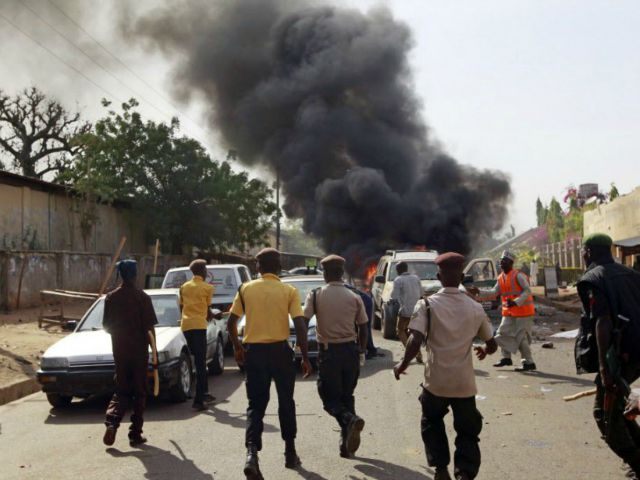The Islamic State-affiliated terrorist group Boko Haram has killed 29 people this week after raiding two Christian villages in northern Borno State.
The attacks occurred as Nigerian President Muhammadu Buhari is in Cameroon to meet with President Paul Biya regarding a strategy to eliminate the terror syndicate.
The two villages attacked are Dille and Mwuthamam in Borno, rare Christian enclaves in the mostly Muslim Nigerian north. Witnesses tell reporters that the attacks followed the typical pattern of village sieges in the area: Boko Haram jihadists shot dead anyone they could, indiscriminately, and burned down as many houses as possible. It is only known so far, the Associated Press notes, that 29 people were killed in Dille, the tally somewhat low as villagers ran and hid in bushes when they first saw an indication of attack. There is no death count for Mwuthamam.
In addition to these two attacks, the AP reports that 15 were killed and 50 injured by a suicide bomber in neighboring Damaturu.
As a testament to the amount of time that often passes between these attacks and villagers notifying authorities or the press, the Dille attack reportedly began on 1PM Monday. Nigeria’s Daily Post offers more details on the Dille attack, including that Dille had been targeted in the past for its Christian population. On July 14, Boko Haram terrorists invaded Dille and burned down three of its churches.
Witnesses say the terrorists raided the town using more sophisticated weaponry than usual, a sign that the group may be receiving aid from elsewhere to strengthen its control over Nigerian territories. Boko Haram merged with the Islamic State to form the Islamic State West Africa Province (ISWAP) earlier this year.
Witnesses stated Boko Haram terrorists were armed with AK-47s, petrol bombs, and an entire convoy of 5 Hilux vehicles.
Daily Trust notes that the terrorists also secured about 200 cows from the village, leaving residents with little protein as sustenance and replenishing their own food supply. Protein is extremely difficult to find in many parts of West Africa, leading to severe malnutrition problems.

COMMENTS
Please let us know if you're having issues with commenting.